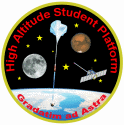



Payload 08 Information
Payload Flight Number:
Institution:
Payload Title:
Distant Aerial Cosmic Radiation Acquisition Package
Student Leader:
Faculty Advisor:
Payload class:
SMALL
Payload ID Number:
08
Mass:
< 3 kg
Current:
< 0.5A
Serial Downlink:
Analog Downlink:
No
Serial Commands:
No
Discrete Commands:
No
Payload Specification & Integration Plan
Due:
Delivered:
Payload Integration Certification
Scheduled:
Actual:
Flight Operation Plan
Due:
Delivered:
Final Flight / Science Report
Due:
Delivered:
Abstract:
Cosmic radiation is one of the main factors standing against space exploration and high altitude activities, due to its hazardous effects on both humans and instrumentation. A better understanding of cosmic radiation, by studying the intensity of radiation at different altitudes, can help to pave the road to a wide range of applications. The proposed experiment will measure the intensity of cosmic radiation with respect to altitude and time, and classify different types of radiation according to their energies. An initial form of this experiment was previously conducted, on Labor Day 2007, by another team from West Virginia University, through the HASP program. To achieve a more reliable scientific outcome, it was decided to take this experiment to the next level, and modify the design by changing the instrumentation to obtain a wider range of measurements. This team will also eliminate the failure elements, one of which caused the last year’s apparatus to stop working at night. It is important to note that the rate of solar particles is at its minimum during sundown, a very important time frame for studying the radiation coming from outside the solar system. This team is comprised of two faculty members and two students from the West Virginia University Mechanical and Aerospace Department and one student from WVU Physics Department.
Science Report:
Monthly Briefings:
|